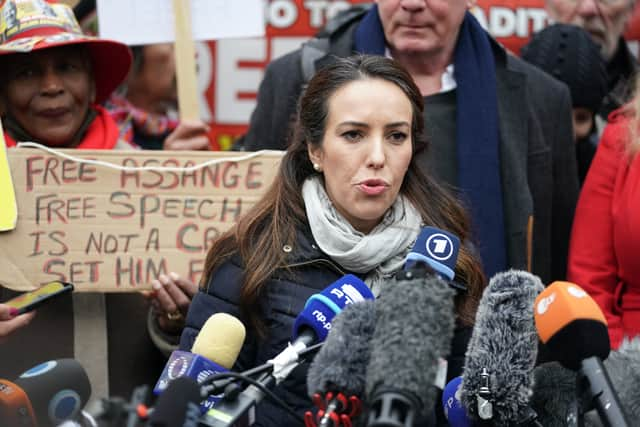Julian Assange: WikiLeaks founder wins first stage of battle to seek US extradition appeal
This article contains affiliate links. We may earn a small commission on items purchased through this article, but that does not affect our editorial judgement.
and live on Freeview channel 276
Julian Assange has won the first stage of his bid to appeal against the decision to extradite him to the United States to the Supreme Court.
Assange, 50, is wanted in the US over an alleged conspiracy to obtain and disclose national defence information following WikiLeaks’ publication of hundreds of thousands of leaked documents relating to the Afghanistan and Iraq wars.
Advertisement
Hide AdAdvertisement
Hide AdIn December last year, US authorities won their High Court challenge to overturn an earlier ruling that Assange should not be extradited due to a real and “oppressive” risk of suicide.
At a glance 5 key points
- Assange is wanted in US over alleged conspiracy to disclose national defence information
- US authorities had won a challenge to overturn a ruling that Assange should not be extradited
- On Monday two judges at the High Court denied Assange’s appeal but said there was a point of law
- They said it was for the Supreme Court to make the decision
- Stella Morris, Assange’s fiancee said what took place in court was “precisely” what they wanted to happen.
Assange’s fiancee, Stella Moris, called the decision “dangerous and misguided” and said the WikiLeaks founder’s lawyers intended to bring an appeal to the Supreme Court.
For a proposed appeal to be considered by the UK’s highest court, a case has to raise a point of law of “general public importance”.
Birnberg Peirce Solicitors, for Assange, previously said the case raised “serious and important” legal issues, including over a “reliance” on assurances given by the US about the prison conditions he would face if extradited.


What happened in court?
Advertisement
Hide AdAdvertisement
Hide AdOn Monday, two senior judges ruled there was a point of law, but denied him permission for the appeal.
However, Lord Chief Justice Lord Burnett, sitting with Lord Justice Holroyde, said Assange could go to the Supreme Court itself and ask to bring the appeal.
“Whether or not the issue needs ventilation in that court is a matter appropriately for its decision,” Lord Burnett said.
Lord Chief Justice Lord Burnett, sitting with Lord Justice Holroyde, said Julian Assange had raised three points of law for the Supreme Court bid, but only succeeded on one about the use of assurances in extradition hearings.
Advertisement
Hide AdAdvertisement
Hide AdThe senior judges said they denied Assange permission to apply to the Supreme Court, but added it was for the Supreme Court justices to make the final decision.
Lord Burnett asked the court to “take steps to expedite consideration of any application” that follows.
In their pronouncement, Lord Chief Justice Burnett and Lord Justice Holroyde granted Julian Assange’s application to “certify a point of law”.
The point of law is: “In what circumstances can an appellate court receive assurances from a requesting state which were not before the court of first instance in extradition proceedings”.
Advertisement
Hide AdAdvertisement
Hide AdThe judges added that “although the law in this jurisdiction has long been settled it does not appear that the Supreme Court has considered the question.
“Assurances are at the heart of many extradition proceedings”.
They continued: “We refuse leave to appeal.
“Whether or not the issue needs ventilation in that court is a matter appropriately for its decision.”
What has Assange’s fiancee said?
In a statement after the ruling, Julian Assange’s fiancee Stella Moris said: “What happened in court today is precisely what we wanted to happen.
Advertisement
Hide AdAdvertisement
Hide Ad“The High Court certified that we had raised a point of law of general public importance and that the Supreme Court has good grounds to hear this appeal. The situation now is that the Supreme Court has to decide whether it will hear the appeal but make no mistake, we won today in court.
“But let’s not forget that every time we win, as long as this case isn’t dropped, as long as Julian isn’t freed, Julian continues to suffer.
“For almost three years he has been in Belmarsh prison and he is suffering profoundly, day after day, week after week, year after year. Julian has to be freed and we hope that this will soon end.
“But we are far from achieving justice in this case because Julian has been incarcerated for so long and he should not have spent a single day in prison. If there had been justice, the officials who plotted, who conspired to murder Julian, would be in the courtroom right now.”
Advertisement
Hide AdAdvertisement
Hide AdShe added: “Our fight goes on and we will fight this until Julian is free.”
A message from the editor:
Thank you for reading. NationalWorld is a new national news brand, produced by a team of journalists, editors, video producers and designers who live and work across the UK. Find out more about who’s who in the team, and our editorial values. We want to start a community among our readers, so please follow us on Facebook, Twitter and Instagram, and keep the conversation going. You can also sign up to our email newsletters and get a curated selection of our best reads to your inbox every day.
Comment Guidelines
National World encourages reader discussion on our stories. User feedback, insights and back-and-forth exchanges add a rich layer of context to reporting. Please review our Community Guidelines before commenting.
